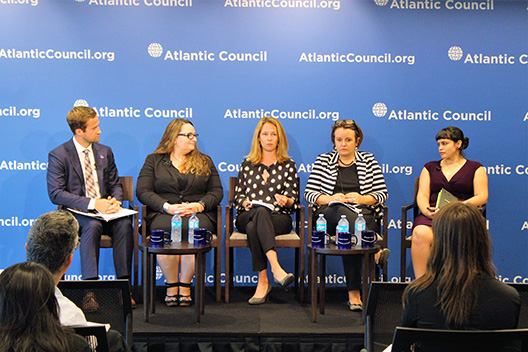On September 21, 2017, the Cyber Statecraft Initiative at the Atlantic Council’s Brent Scowcroft Center on International Security hosted a panel discussion on Nonresident Senior Fellow, Andrea Matwyshyn’s current research project: The Internet of Bodies and the game-changing security, legal, and ethical implications of Internet-connected medical implants. The Hon. Franklin D. Kramer provided opening remarks for the event.
David Forscey, a Policy Analyst for the Homeland Security and Public Safety Division of the
National Governors Association moderated a panel comprised of Dr. Andrea Matwyshyn, Nonresident Senior Fellow for the Cyber Statecraft Initiative and Professor of Law at Northeastern University; Terrell McSweeny, Commissioner of the Federal Trade Commission; Janine Medina, a Biohacker and the Project Manager of the Biohacking Village at DEFCON; and Gail Slater, General Counsel of the Internet Association.
For years, cybersecurity has focused on physical objects that comprise the Internet of Things, but with technological advances in healthcare, this now includes medical implants. What began with external, smart objects like FitBits, has steadily grown to internet-connected pacemakers, cochlear and microchip implants, and more. With the implementation of the Digital Millennium Copyright Act in 2016, we now face a new era of imperative and legal security research of consumer devices that are attached to both the Internet and the human body. This “Internet of Bodies” will inevitably expose us to unprecedented cybersecurity vulnerabilities, introduce conflict across several legal regimes, and raise fundamental ethical questions about the future of what it means to be human in an age of technology-mediated bodies and artificial intelligence.
Image: (L-R: David Forscey, Andrea Matwyshyn, Terrell McSweeny, Gail Slater and Janine Medina discuss the legal, security and ethical implications of connected medicine.)
